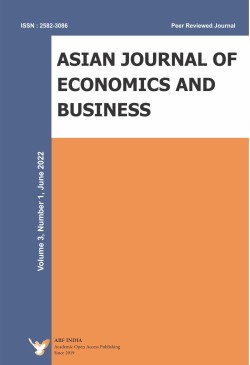
Asian Journal of Economics and Business
Frequency :Bi-Annual
ISSN :2582-3086
Peer Reviewed Journal
This paper extends Zhangs monetary growth model with the Taylor rule by allowing all constant parameters to be time-dependent parameters (Zhang, 2019). The original model is built on basis of the Solow model, the Tobin growth money with money, and the Taylor rule. This study examines effects of different time-dependent exogenous periodic shocks on the monetary growth economy. We show how various exogenous periodic shocks causebusiness cycles.
This study analyzed Burundi’s imports from EAC countries for selected food commodity. The study was carried out using an intensity of trade approach. More specifically, the studycritically analyzed the intensity of Burundi’s food imports from Kenya, Uganda, Tanzania and Rwanda. In this study which is limited in time (from 2003 to 2018), only four food commodities namely maize, rice, sugar and wheat were taken into account. The results were depicted using histograms. Findings revealed that among other EAC countries, Burundi intensively imported maize,riceand wheat from Uganda followed by Tanzania. However, an exception was noted for the case of sugar: findings indicated that Burundi intensively imported sugar from Kenya followed by Uganda. Lastly, findings indicated that the intensity of Burundi’s imports from Rwanda in the aforementioned selected food commodities remained relatively low when compared to that of other EAC partner countries.
Keywords: International trade, food trade; intensity of trade, regional economic communities.
As today’s empowered consumers increasing put businesses under pressure to co-create value with them, businesses are uncertain if involving customers in value co-creation is a potent strategy for winning customers’ loyalty. This study attempts to predict customer loyalty based on the DART (dialogue, access, risk assessment and transparency) model of co-creation. In a cross-sectional survey, involving 364 clients of pension service firm across MDAs in Southeastern Nigeria, we found that the dialogue, access and transparency dimensions of co-create significantly predicts customer loyalty. The implication of the study for practice is discussed.
Keywords: value co-creation, customer loyalty, dialogue, pension fund, Nigeria
This study explores the role of financial inclusion and ICT diffusion on poverty reduction across 27 Sub-Sahara African countries for the period of 2004 to 2017. We applied non-stationary heterogeneous panel estimation technique which comprises of pooled mean group (PMG), mean group (MG), and dynamic fixed effect (DFE) estimators. Based on the result of the pooled mean group estimator, we found that financial inclusion (proxied by number of commercial branches per 100,000 people (COM)) reduces poverty in the long run but it exerts no impact on poverty reduction in the short run. Further, the result indicates that ICT diffusion (proxied by internet penetration (IP) exert a significant reduction in poverty in the short run but has no impact on poverty reduction in the long run. The study therefore concludes that financial inclusion and ICT diffusion (proxied by internet penetration) are crucial in alleviating poverty in SSA countries. Thus, to alleviate poverty in SSA region, government and monetary authorities should enhance financial inclusion strategies combined with latest ICT infrastructural development, especially the internet usage.
Keywords: Financial Inclusion, Information and Communication Technology Diffusion, Poverty Reduction, Panel ARDL
JEL Classification: G21; O33; I32
In the article mining industry is characterized as one of the most important strategic sectors of the developing economy of the country and it is specified that economic stability is largely determined by the activities of gold mining enterprises, many of which are not in the best position, as there are problems that limit their development. It has been substantiated that in Tajikistan, where a market economy is being formed, the innovation policy is aimed at implementing measures to ensure the balanced development of science and industry, the development of innovation infrastructure, the creation of conditions for the commercialization of the results of scientific research and development, and professional training adequate to the needs of innovative development.
Keywords: innovation, industry, mining industry, enterprises, administrations, innovative development, investments.
This paper assesses the impact of electronic payment system in India. It is expected that GST implementation could have two outcomes on electronic payment systems; one is either boost he use of electronic payment or decrease it in an attempt to evade tax payment. Thus, our objective is to find out if this policy change has an immediate impact or not. The findings of the research work reveal that GST implantation did not lead to any change in the use of electronic procedure in the country. The impact is expected to come after few months of the policy implementation.
Keywords: GST, electronic payment system, cashless economy
This study investigates the role of trade liberalization in China’s economy over the period 1980-2018. The Johansen cointegration and Granger causality tests, impulse response functions, and variance decomposition analysis are used in this study. The cointegration test indicates that GDP is positively related to trade openness, gross fixed capital formation, final consumption expenditure, and inflation, but negatively related to the oil price.The causality test reveals bidirectional short and long run causality relationships between trade openness, oil price, gross fixed capital formation, final consumption expenditure, inflation and GDP. The result also indicates that final consumption expenditure has the biggest effecton GDP, which suggest that improving standard of living, investments and trade openness will have tremendous effect on the economic growth.
Keywords: China, economic growth, trade openness, VAR.
JEL Classifications: O11, E20